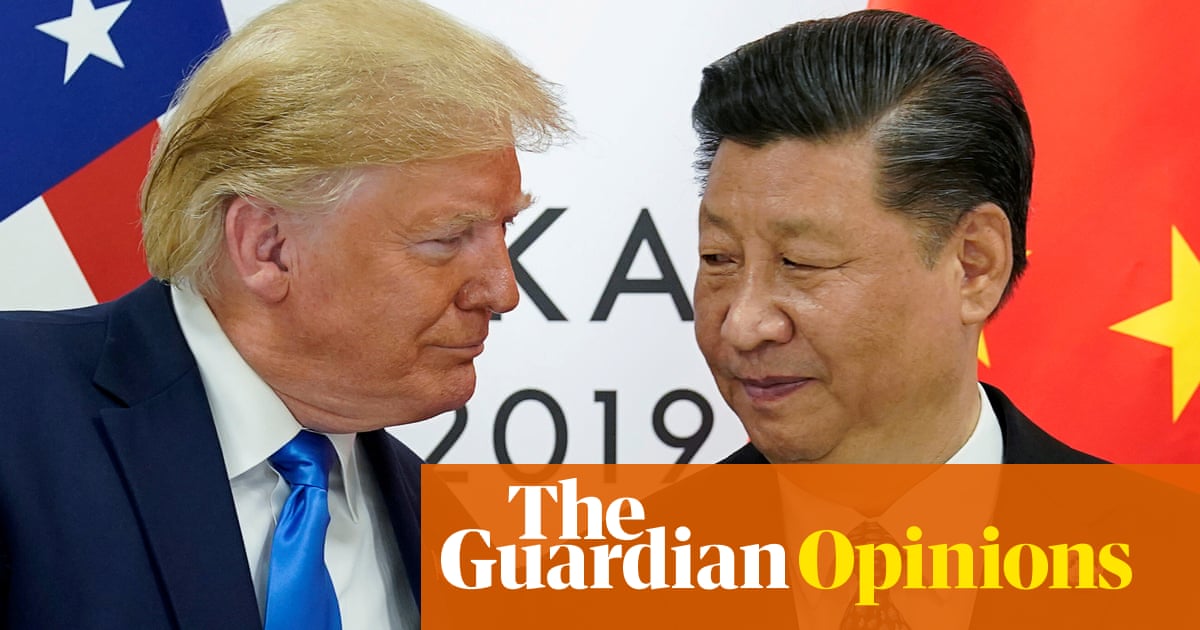The Guardian view on the China-US trade wars: the global economy is at risk
Xi Jinping’s newfound readiness to let the yuan float sends a worrying message that there will be no deal by the end of August deadline
Events have moved disturbingly swiftly since Donald Trump surprised everyone last week by announcing plans for a fresh wave of tariffs on Chinese imports. Beijing retaliated by targeting US agricultural products and allowing its currency to depreciate against the US dollar. Mr Trump duly fired off a tweet accusing the Chinese of currency manipulation, a clear sign that he is preparing to ratchet up the tension still further. Financial markets have responded predictably to this major escalation in the economic cold war. Share prices fell and investors sought out the traditional safe haven assets: gold and the swiss franc.
When the US president announced his first wave of protectionist measures in March 2018 he boasted that trade wars were good and easy to win. That’s not the way that the markets see things. They see the world’s two biggest economies digging in for the long haul and Mr Trump intensifying global trade tensions in order to pressurise America’s central bank, the Federal Reserve, to cut interest rates.
The markets are not always right – but this time they are. There is something eerily reminiscent of the summer of 1914 about the state of US-China relations. Neither side wants a trade war. Both countries would be damaged by a trade war. But step-by-step a trade war comes closer. The latest US tariffs come into force in less than four weeks’ time. Without question these are the most crucial weeks for the global trading system since the 1930s. If Mr Trump and China’s president, Xi Jinping, miscalculate, as all the signs suggest that they might, the upshot will be a full-blown trade and currency war that will shred business confidence, close factories and increase unemployment. While the direct impact of Mr Trump’s latest tariffs will be relatively small – knocking perhaps a tenth of a percentage point off Chinese growth – the collateral damage will be far more severe.
Mr Trump thinks his trade measures are hurting China’s economy and that this will force Mr Xi to bow to the main US demands: greater market access and an end to Chinese piracy of American intellectual property. The White House is right in the first of these assumptions, but not in the second. China’s economy is growing at its slowest rate in almost three decades and US tariffs are certainly one of the reasons for that. But Beijing tends to play things long, which makes its willingness to allow the yuan to rise above seven to the dollar both significant and worrying.
China has until now been keen to avoid the accusation by Mr Trump that it is using an under-valued currency to secure an unfair advantage for its exporters, so has been intervening heavily to prevent a depreciation of the yuan against the dollar. The fact that Mr Xi is now prepared to be branded by Mr Trump as a currency manipulator suggests that he may have given up hope of a deal.
Instead, Mr Xi seems prepared to wait and see whether Mr Trump’s bellicosity comes back to haunt him in the 2020 presidential election race. The latest wave of tariffs makes that outcome more likely because the inclusion of virtually everything China exports to the US means that consumer products such as smart phones, laptops and clothes will be hit for the first time. The US president, judging by his tweets, seems to think that China pays the tariffs when in fact they are actually paid for by US voters through higher prices.
It is not too late for peace to break out. Mr Trump is likely to come under pressure from Republicans in Congress who think a trade war will damage their re-election chances next year. Talks between US and Chinese officials might pave the way for a compromise that allows both sides to save face. The US president might look at the panic on Wall Street and decide that it is time to do a deal.
But that’s not the way things currently look. Mr Trump is right when he says China has played fast and loose with the rules of the global trading system. He is right too in his assessment that China would come off worse in a prolonged protectionist battle. No question, the US could win a trade war. But it would be the dictionary definition of a pyrrhic victory.




